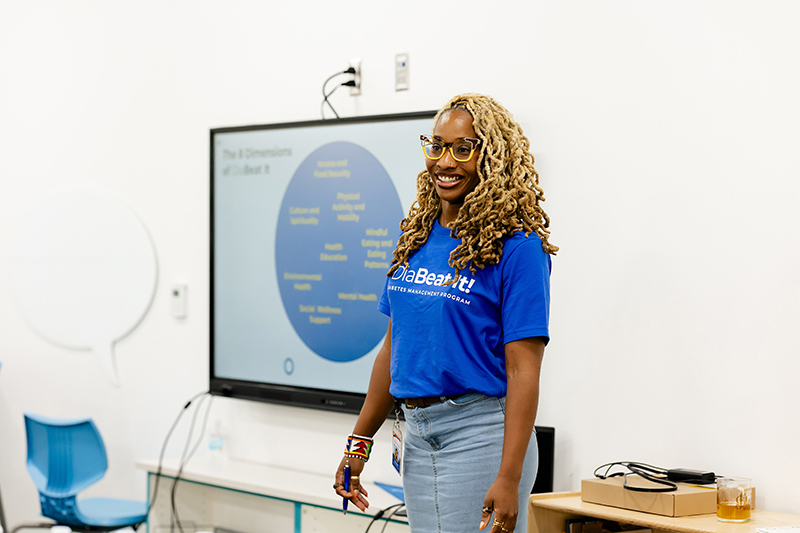By Alex Bass
Alex.bass@triangletribune.com
RALEIGH – Diabetes does not need a name or face, nor does it have defining characteristics. Donnae Ward, health equity coordinator at Advance Community Health, knows the implications of these realities. “We also know that this is something historical in terms of environmental racism, too,” she said.
An adverse health condition for everyone is magnified among communities of color – more prone to encounter challenges in accessing grocery stores, healthier foods and affordable health care. Ward’s answer is the intentional creation of culturally diverse, teaching and learning melting pots to “DiaBeat It.”
Advance Community Health, on Rock Quarry Road, began the model program in January. DiaBeat It includes eight dimensions: access and food security, physical activity and mobility, mental health, social wellness support, environmental health, mindful eating, health education, and culture and spirituality. Ten individuals completed the initial, six-month program from January to June.
The second cohort began in August and operates on a three-month plan. Beyond Advance Community Health patients and employees, who participate free of charge, community members may enroll in future cohorts for $50. Evening classes are held at the Southeast Raleigh YMCA.
“Finally,” exclaimed Lizette Santiago, also an ACH care coordinator. “I wanted something to hold me accountable and, at the same time, have support.” Santiago attributed her supportive foundation to Ward. “She looks at statistics,” Santiago said of Ward. “She’s trying her best to do what she can to educate and motivate, and bring change for the better to her community.”
Ward spoke frankly about diabetes and high blood pressure, and their interwoven realities. Eight percent of Raleigh’s population has Type 2 diabetes, but 21% of those cases, Ward said, are among southeast Raleigh residents. She added that 28% of Raleigh lives with high blood pressure, with half of the cases in southeast Raleigh. “Just looking at that alone should be alarming,” Ward said.
For Ward, the data offered a chance to amplify inclusive creativity. “Every week was always something. We were either cooking, or we had a speaker,” said A.K., a first cohort graduate who shared her experiences while seeking to protect her medical history. “We helped the chef. He explained the health benefits of using the ingredients we were using.” A.K. noted how helpful it was to visit a grocery store with a nutritionist, and gather insight on reading labels and packages. She lost 20 pounds in six months. “I make better decisions with each meal. I start with the meal that is in front of me,” she said. “I’m taking the accountability of using what I have in my refrigerator and using what is healthy.”
Ward said 9 of 10 graduates saw decreases in their A1C levels. A.K. said her A1C level declined from 8.1 to 6.4 over three months. “Everybody should go through this class – with or without diabetes,” she said.
Ward is eager to welcome future cohorts for a program she considers still in pilot mode, including deciding if three or six months is more effective. The second cohort’s seven participants can look forward to Ward’s continuing creativity, including a potential spa day as a reminder that holistic care is vital.
“We’re going to talk about stress. We’re going to do the hand massages. We’re going to talk about essential oils,” Ward said. Diabetes and high blood pressure, she continued, have implications for nerve health and even vision.
“Soul food is delicious. Spanish food is delicious,” Santiago said. “We all enjoy each other’s culture as far as food.”
Santiago and her husband enjoyed cooking in class, and the fusion of cultures – including collard greens tinged with Caribbean influences, and vegetable fried rice with what Santiago called a “Hispanic twist.” Santiago, who has incorporated gym activities into at least three days per week, said using healthy food to begin meaningful friendships is a beginning for cultivating lifetime habits.
“This is a journey. It is not a sprint,” Santiago said. “If you do something different each and every day, and you increase it each and every week, then you will see results.”

